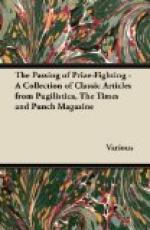The train journey was cold and lonely. Nobody he knew was travelling up to town. He bought a daily paper, but the headlines put him off. They were nearly all about divorce cases. There was one about a man who had lived for three years in the same house with his wife without speaking to her. Such things were possible! He gazed out of the window. The wonderful day had no charm for him. The feeling of autumn only further increased his sense of the loss of youth, of the decay of romance. He nursed and nourished his grievance. He desired that Mary should know what a wreck she had made of his day, possibly of his life.
He was in no mood for work. He went up to his studio in Fitzroy Square and muddled about with pens and ink. He had what he called a good tidy up, and firmly and consistently threw away every relic of sentiment he had foolishly preserved. At one o’clock, through habit and not because he was hungry, he went out and had a lonely lunch at a small restaurant, sitting at a marble-topped table which imparted to him something of its chill. After that he loafed about looking at things till dusk. Dusk was quite unbearable. He fled back to the studio, made up a stupendous fire, lit a pipe and mused.
He decided not to go home that night. He felt hurt and ill-used. He would stay in town and have a thoroughly good time. As the idea struck him he looked round the studio. The corners were dismal and shadowy. Everything not in the immediate circle of the fire looked grey and cheerless. His easel, with a bit of drapery thrown across it, was like a spectre with outstretched arms. It suggested despair. He could think of no one whom he wanted to see. There wasn’t a soul he knew whom he would not in this crisis deliberately have avoided.
So he went to the Russian Ballet and was bored. He had been excited about Cleopatra the first time he had seen it; he now decided that it was a great mistake to try to repeat emotional experiences.
He left hurriedly before the programme was half over. His feet took him mechanically to Waterloo Station. He looked up a train. The 9.30 was due out; he sprinted and caught it. The carriage he managed to get into was empty and warm. He slept; he slept all the way, and it did him good.
When he arrived at the other end the night was calm and the sky star-spangled. The walk out exhilarated him; his exasperation was over. He ran lightly down the leaf-strewn steps of the old garden and looked in at the window. Mary was seated at the fire. She looked pensive, pretty and a little sad. He whistled and she smiled up. “Hooray!” she said, “I’d nearly given you up.” She slipped round and had the door open before he could get out his key and drew him in. She helped him off with his coat and scanned his face with even more than her usual intentness and interest. But she didn’t ask him why he was late and he didn’t tell her. He thought that could wait.




